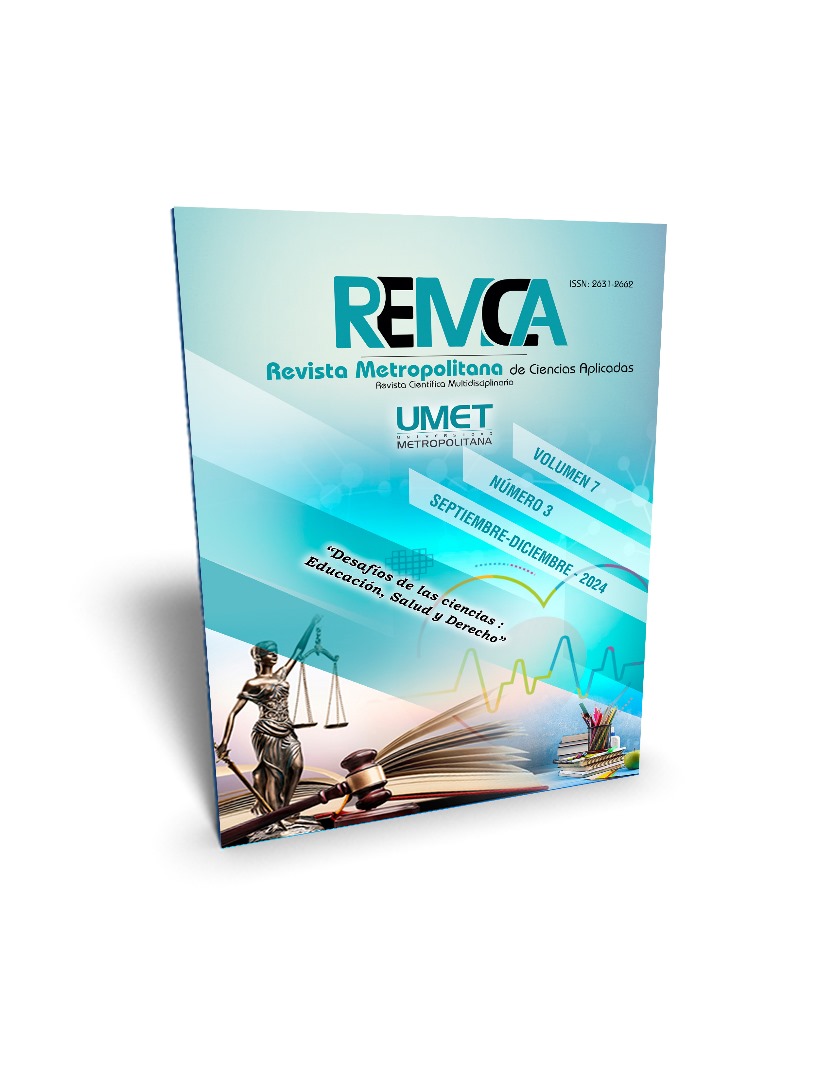Formación continua y habilidades directivas en autoridades educativas en una Dirección Distrital de Educación, Guayas, Ecuador 2024
DOI:
https://doi.org/10.62452/hwk34c10Palabras clave:
Directivos educativos, educación continua, formación continua, gestión escolar, habilidades directivasResumen
En la actualidad el fomento de la formación continua y el logro de habilidades directivas constituye un tema crucial para el logro de una gestión educativa efectiva. Sin embargo, el 74% de los profesionales que están a liderando instituciones educativas no reciben formación continua especializada. En este sentido, se estimó como objetivo determinar el grado de relación entre la formación continua y las habilidades directivas en las autoridades educativas en una Dirección Distrital de Educación, de Guayas Ecuador 2024. La investigación realizada es de tipo básica, se realizó un diseño no experimental, de nivel descriptivo correlacional y de enfoque cuantitativo. La muestra censal estuvo conformada por 41 directivos de escuelas fiscales. Se aplicó la técnica de la encuesta y el instrumento fue un cuestionario para las variables formación continua y habilidades directivas. Se concluyó, a partir de la prueba de Rho de Spearman, un coeficiente de correlación igual a 0,767 y un nivel de significancia bilateral de 0,01, que la correlación positiva es alta y existe una relación significativa entre la formación continua y las habilidades directivas en las autoridades educativas en el contexto objeto de estudio.
Descargas
Referencias
Aguirre, V. (2021). The continuous training of early childhood teachers in Latin America: a systematic review. Revista de Investigación Valdizana, 15(2), 101-111. https://www.redalyc.org/articulo.oa?id=586068493005
Argyris, C., & Schön, D. (1989). Participatory action research and action science compared: A commentary. American behavioral scientist, 32(5), 612-623. https://doi.org/10.1177/0002764289032005008
Chapa, E. (2023). Managerial Skills in State Business Management, Generating Social Well-being. Revista Internacional de Investigación en Ciencias Sociales, 19(1), 115-130. https://doi.org/10.18004/riics.2023.junio.115
Cuadrado, K. (2023). La formación continua en el desarrollo profesional de equipos directivos escolares. Uruguay 2019-2021. [Tesis de maestría, Instituto Tecnológico y de Estudios Superiores de Monterrey]. https://repositorio.tec.mx/handle/11285/650789?show=full
Delors, J. (1997). La educación encierra un tesoro: informe para la UNESCO de la Comisión Internacional sobre la Educación para el Siglo Veintiuno. https://redined.educacion.gob.es/xmlui/bitstream/handle/11162/203443/000001c_Pub_UE_Informe_Delors_Compendio_c.pdf?sequence=1&isAllowed=y
Duncker, K. (1945). On problem-solving. (Psychological Monographs, No. 270.). American Psychological Association.
Goleman, D. (2018). Inteligencia emocional en la empresa. Conecta.
Guarnizo, W. (2018). Las habilidades gerenciales como eje fundamental en la gestión del talento humano en las Instituciones de Educación Superior. (Tesis de maestría). Universidad Técnica de Ambato.
Hernández, R., Fernández, C., & Baptista, P. (2014). Metodología de la Investigación. McGraw-Hill Education.
Hersey, P., & Blanchard, K.H. (1996). Great ideas revisited. Training and Development Journal, 50 (1), 42-47. https://www.proquest.com/docview/227011580?pq-origsite=summon&sourcetype=Trade%20Journals
Hsieh, C., Gunawan, I., & li, H. (2023). A Bibliometric Review of Instructional Leadership Research: Science Mapping the Literature from 1974 to 2020. Revista de Educación, 401, 293-324. https://doi.org/10.4438/1988-592X-RE-2023-401-592
Katz, R.L. (1955). Skills of an Effective Administrator. Harvard Business Review Press.
Knowles, M. (2015). The adult learning theory. Routledge.
Mezirow, J. (2009). Transformative learning theory. In Contemporary theories of learning. Routledge.
Pazmiño Gavilánez, W. E., Parrales Higuera, M.G., Muñoz Oviedo, L.I., & Merchan Jacome, V.A. (2019). Habilidades directivas fundamentales en la administración pública. Revista Científica Mundo de la Investigación y el Conocimiento, 3(3), 682-705. https://dialnet.unirioja.es/servlet/articulo?codigo=7402258
Peñares Gutiérrez, A.M. (2021). Liderazgo directivo y gestión pedagógica en instituciones educativas públicas de nivel secundaria, Cartavio-2019. Tesis de maestría). Universidad César Vallejo.
Schon, D.A. (1991). The reflective practitioner: How professionals think in action. Routledge.
Silva, R. (2021). Habilidades gerenciales en el desarrollo organizacional de las empresas de servicio informático, San Isidro 2020. Digital Publisher CEIT, 6(2), 148-163. https://doi.org/10.33386/593dp.2020.6.314
Vezub, L. (2024). La política de formación continua en Argentina: opiniones de directivos de educación secundaria sobre las actividades y necesidades de desarrollo profesional docente. Revista Electrónica Interuniversitaria de Formación del Profesorado (REIFOP), 27(1), 45-60. https://doi.org/10.6018/reifop.596501.
Yagil, D., & Oren, R. (2021). Servant leadership, engagement, and employee outcomes: the moderating roles of proactivity and job autonomy. Revista de Psicología del Trabajo y de las Organizaciones, 37(1), 59-68. https://dx.doi.org/10.5093/jwop2021a1
Descargas
Publicado
Número
Sección
Licencia
Derechos de autor 2024 Revista Metropolitana de Ciencias Aplicadas

Esta obra está bajo una licencia internacional Creative Commons Atribución-NoComercial-CompartirIgual 4.0.
© Podrá reproducirse, de forma parcial o total, el contenido de esta publicación, siempre que se haga de forma literal y se mencione la fuente.


